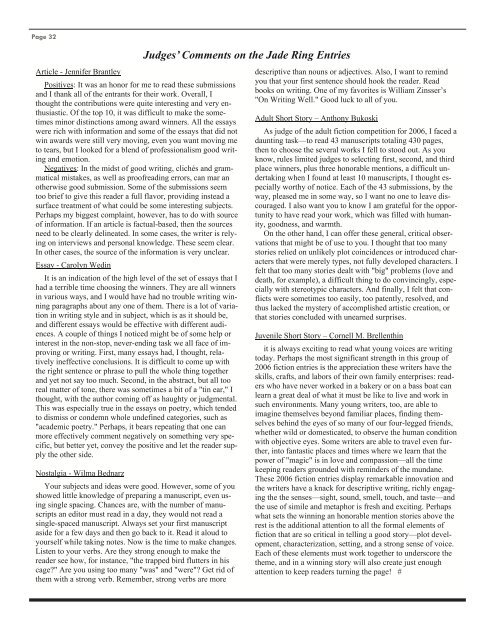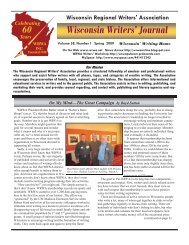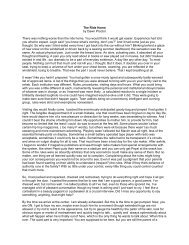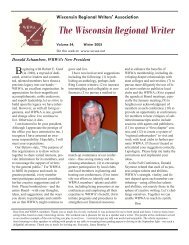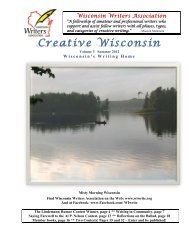WRWA Newsletter.pub - Wisconsin Writers Association
WRWA Newsletter.pub - Wisconsin Writers Association
WRWA Newsletter.pub - Wisconsin Writers Association
Create successful ePaper yourself
Turn your PDF publications into a flip-book with our unique Google optimized e-Paper software.
Page 32<br />
Article - Jennifer Brantley<br />
Positives: It was an honor for me to read these submissions<br />
and I thank all of the entrants for their work. Overall, I<br />
thought the contributions were quite interesting and very enthusiastic.<br />
Of the top 10, it was difficult to make the sometimes<br />
minor distinctions among award winners. All the essays<br />
were rich with information and some of the essays that did not<br />
win awards were still very moving, even you want moving me<br />
to tears, but I looked for a blend of professionalism good writing<br />
and emotion.<br />
Negatives: In the midst of good writing, clichés and grammatical<br />
mistakes, as well as proofreading errors, can mar an<br />
otherwise good submission. Some of the submissions seem<br />
too brief to give this reader a full flavor, providing instead a<br />
surface treatment of what could be some interesting subjects.<br />
Perhaps my biggest complaint, however, has to do with source<br />
of information. If an article is factual-based, then the sources<br />
need to be clearly delineated. In some cases, the writer is relying<br />
on interviews and personal knowledge. These seem clear.<br />
In other cases, the source of the information is very unclear.<br />
Essay - Carolyn Wedin<br />
It is an indication of the high level of the set of essays that I<br />
had a terrible time choosing the winners. They are all winners<br />
in various ways, and I would have had no trouble writing winning<br />
paragraphs about any one of them. There is a lot of variation<br />
in writing style and in subject, which is as it should be,<br />
and different essays would be effective with different audiences.<br />
A couple of things I noticed might be of some help or<br />
interest in the non-stop, never-ending task we all face of improving<br />
or writing. First, many essays had, I thought, relatively<br />
ineffective conclusions. It is difficult to come up with<br />
the right sentence or phrase to pull the whole thing together<br />
and yet not say too much. Second, in the abstract, but all too<br />
real matter of tone, there was sometimes a bit of a "tin ear," I<br />
thought, with the author coming off as haughty or judgmental.<br />
This was especially true in the essays on poetry, which tended<br />
to dismiss or condemn whole undefined categories, such as<br />
"academic poetry." Perhaps, it bears repeating that one can<br />
more effectively comment negatively on something very specific,<br />
but better yet, convey the positive and let the reader supply<br />
the other side.<br />
Nostalgia - Wilma Bednarz<br />
Your subjects and ideas were good. However, some of you<br />
showed little knowledge of preparing a manuscript, even using<br />
single spacing. Chances are, with the number of manuscripts<br />
an editor must read in a day, they would not read a<br />
single-spaced manuscript. Always set your first manuscript<br />
aside for a few days and then go back to it. Read it aloud to<br />
yourself while taking notes. Now is the time to make changes.<br />
Listen to your verbs. Are they strong enough to make the<br />
reader see how, for instance, "the trapped bird flutters in his<br />
cage" Are you using too many "was" and "were" Get rid of<br />
them with a strong verb. Remember, strong verbs are more<br />
Judges’ Comments on the Jade Ring Entries<br />
descriptive than nouns or adjectives. Also, I want to remind<br />
you that your first sentence should hook the reader. Read<br />
books on writing. One of my favorites is William Zinsser’s<br />
"On Writing Well." Good luck to all of you.<br />
Adult Short Story – Anthony Bukoski<br />
As judge of the adult fiction competition for 2006, I faced a<br />
daunting task—to read 43 manuscripts totaling 430 pages,<br />
then to choose the several works I fell to stood out. As you<br />
know, rules limited judges to selecting first, second, and third<br />
place winners, plus three honorable mentions, a difficult undertaking<br />
when I found at least 10 manuscripts, I thought especially<br />
worthy of notice. Each of the 43 submissions, by the<br />
way, pleased me in some way, so I want no one to leave discouraged.<br />
I also want you to know I am grateful for the opportunity<br />
to have read your work, which was filled with humanity,<br />
goodness, and warmth.<br />
On the other hand, I can offer these general, critical observations<br />
that might be of use to you. I thought that too many<br />
stories relied on unlikely plot coincidences or introduced characters<br />
that were merely types, not fully developed characters. I<br />
felt that too many stories dealt with "big" problems (love and<br />
death, for example), a difficult thing to do convincingly, especially<br />
with stereotypic characters. And finally, I felt that conflicts<br />
were sometimes too easily, too patently, resolved, and<br />
thus lacked the mystery of accomplished artistic creation, or<br />
that stories concluded with unearned surprises.<br />
Juvenile Short Story – Cornell M. Brellenthin<br />
it is always exciting to read what young voices are writing<br />
today. Perhaps the most significant strength in this group of<br />
2006 fiction entries is the appreciation these writers have the<br />
skills, crafts, and labors of their own family enterprises: readers<br />
who have never worked in a bakery or on a bass boat can<br />
learn a great deal of what it must be like to live and work in<br />
such environments. Many young writers, too, are able to<br />
imagine themselves beyond familiar places, finding themselves<br />
behind the eyes of so many of our four-legged friends,<br />
whether wild or domesticated, to observe the human condition<br />
with objective eyes. Some writers are able to travel even further,<br />
into fantastic places and times where we learn that the<br />
power of "magic" is in love and compassion—all the time<br />
keeping readers grounded with reminders of the mundane.<br />
These 2006 fiction entries display remarkable innovation and<br />
the writers have a knack for descriptive writing, richly engaging<br />
the the senses—sight, sound, smell, touch, and taste—and<br />
the use of simile and metaphor is fresh and exciting. Perhaps<br />
what sets the winning an honorable mention stories above the<br />
rest is the additional attention to all the formal elements of<br />
fiction that are so critical in telling a good story—plot development,<br />
characterization, setting, and a strong sense of voice.<br />
Each of these elements must work together to underscore the<br />
theme, and in a winning story will also create just enough<br />
attention to keep readers turning the page! #


